By Cristina Modreanu
For 14 days, between September 5 and 18, a small city in Romania became the stage for a series of events: new theatre performances from all over the country and from the neighbouring countries, exhibitions (Virus Diary, conceived and developed by Dan Perjovschi, Europe as Task, part of Vaclav Havel European Dialogues and others), book launchings, documentary film projections, debates, video mapping, a VR production, workshops for the actors and for the young spectators and concerts. This was the 33rd edition of Piatra-Neamt Theatre Festival and for a week I enjoyed here a true reconnection with the contemporary theatre stage.
My driver took me more than five hours across the Carpathian Mountains to Piatra-Neamt where I was going to launch my new book1. He has been working as a driver for Teatrul Tineretului (Youth Theatre) in Piatra-Neamt for more than 15 years, so the conversation was relevant as a seismograph of the changes under three different managers: “Never before have I seen so many investments in this theatre,” he told me. He was driving the new car of the theatre, which was proving his point. But we also talked about the war, about the many Ukrainians coming as refugees to Piatra-Neamț which is only 146 km away from the closest border. He told me that a family with three women of different generations and 6 children has been living for a while now in the same block of flats as his family and he was very impressed by this. The men stayed to fight for their country.
Romanians have tended to identify themselves with the Ukrainians since the war started, first because the war is very close to Romanian borders, secondly because we also have a complicated history with Russia – even though nothing as entangled as theirs. As a small nation under the influence of the former Soviet Empire for 45 years, we still remember how it feels to live with a huge shadow above our heads.
The Piatra-Neamt Theatre Festival is one of the oldest in the country, crossing the last half of the century, over two political regimes and the transition period between them. Since 2017, the first edition organized by the new management of director-playwright Gianina Cărbunariu, the festival has had a new theme every year. It was Youth in 2017, The archives of insecurity in 2018 – for the 30th-anniversary edition coinciding with the 60th anniversary of this theatre]; then Success! in 2019 with the subtheme After 30 years, and Postpresent in 2021, when the festival was organized again after a one-year pandemic gap.
In 2022, for the 33rd edition, the chosen theme was in direct connection with the war developing next door and formulated in kilometres: “146 km is the distance from the theatre of Youth in Piatra-Neamt to the Siret customs post on the border between Romania and Ukraine. 146 Km is a distance that separates two realities: that of a troubled normality and that of a war marked by acts of unacceptable violence,” noted Cărbunariu in the program of the festival. She led the curatorial team alongside director Daniel Chirilă and artistic consultant Raluca Năclad, both working full-time in the same theatre.
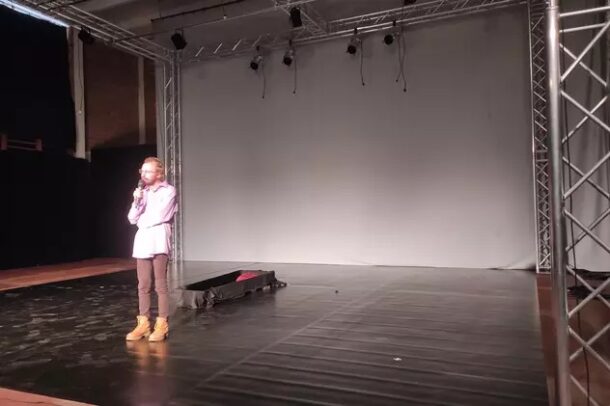
Decolonizing myself, by Artur Sumarokov. Photo: Marin German.
When I arrived at the festival, everyone was talking about the guest performance of Ukrainian artist Artur Sumarokov Decolonizing myself, who confessed on stage that since the war started, he has made attempts to erase all connections with Russian culture and exemplified these attempts on stage. His struggles were the pretext for a broader discussion about cultural connections, cultural colonization and even “cancel culture,” as some of the other international guests of the festival were worried that the political circumstances would encourage the exclusion of Russian artists from theatre stages in the world. In one scene of his production, Sumarokov destroys old books by Dostoievski and other Russian writers.
Other artists’ productions from Ukraine or the countries neighbouring it, like Moldavia, Estonia, and Latvia and readings with plays by Ukrainian author Natalia Blok were included in the festival as a solidarity gesture in the current global political context. Is theatre supposed to take sides in such a conflict? What power do artists have to change things in a war situation? Can they help people to go through difficult times like these? The questions were looming above and the festival atmosphere was charged by them.
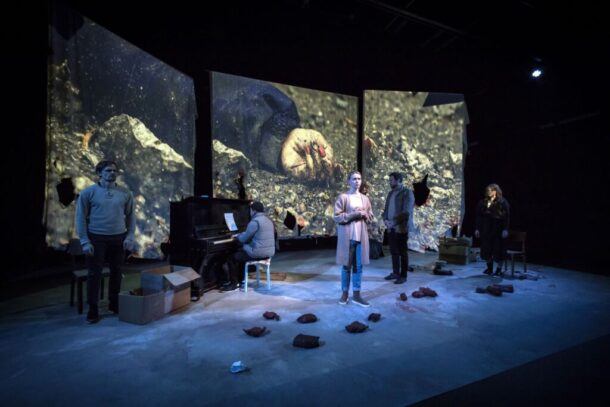
Ukraine. Letters from the front, produced by Vaba Lava (Open Space) Estonia. Photo: Vaba Lava.
One of these productions, Ukraine. Letters from the front, produced by Vaba Lava (Open Space) Estonia, set the stage for making the voices of both Ukrainian and Russian citizens heard, focusing on private correspondence with some of the people who decided not to leave the country and fight one day at a time to preserve their way of life in the name of a lost normality. Their struggle to keep on going despite the noise of war amplified by the media and heard daily in the streets was not “exploited” theatrically, but presented by the creator of the performance, actress Julia Aug, with simplicity and respect. The messages she selected came from her friends, which made everything more personal and touching, the personal dimension becoming more important than the aesthetical one.
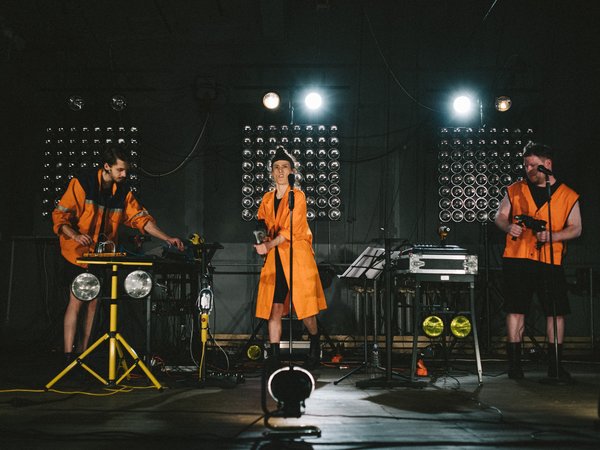
Symphony of Progress, collective creation of the Moldavian group led by Esinencu. Photo: Ramin Mazur.
It must be said that beyond the current war, in this part of the world there is another open front, an ideological one, where the right and the left confront each other, with a dangerous rise of the right side of the political spectrum registered in many European countries. Coming from a country aspiring, like Ukraine, to be part of the European Union, Moldavian playwright Nicoleta Esinencu has been a tireless critic of the western values imposed on different nations from the former Soviet Bloc, as an effect of the process of joining the EU. Well-known for one of her first plays, Fuck you, Europe!, Esinencu was invited to Piatra-Neamt Theatre Festival with a new co-production of teatru-spalatorie from Chișinău and HAU Hebbel am Ufer from Berlin – ironically titled Symphony of Progress. A collective creation of the Moldavian group led by Esinencu, Symphony of Progress contests the idyllic idea of progress as promoted by Western societies, arguing that this is a cover for inequalities and exploitation of the East by the West. The situations which inspired the performance were much discussed in the media in the middle of the pandemic times, when workers from Eastern countries, including Romania, were called for by contractors from Western countries to perform work considered unworthy by their own citizens. Travel restrictions at the time were suspended for these flights considered “economically essential.” Using in a performative way the hammering sound of various work tools manipulated by the actors on stage, very close to the spectators who can feel the noise as well as hear it, the production creates a space of awareness while forcing on the audience a point of view lacking nuances. One of these nuances address the perpetuated economic imbalance between East and West which makes the working force from the first eager to perform work for the second, instead of enduring asperities in their own countries. Played in Moldavian Romanian (people from Moldavia, a former part of Romania, speak Romanian, Russian or both), Russian and English, Symphony of Progress is a powerful example of minimalistic performance intelligently using obsessive sounds and words in order to transfer a political message.
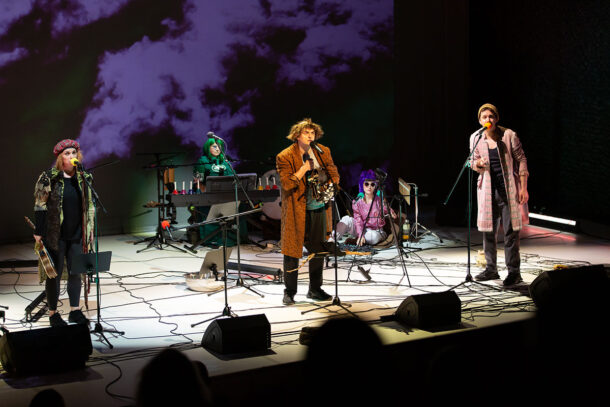
The Tempest, by Ada Milea, translation by Cristi Juncu. Photo: Theatre Bulandra.
Manipulation of sound was also purposefully used in another production, a revisiting of Shakespeare’s The Tempest, created by actor and composer Ada Milea, with help from Cristi Juncu, who made a new translation of the play. On a stage full of microphones looking like a forest, among which video cameras are also planted, a small cast of only five actors from Bulandra Theatre in Bucharest perform all the main roles while creating live the original soundtrack composed by Milea who also wrote the lyrics for all the songs. Two of the actors share the role of Ariel and the other three literally run from one scene to another changing a few clothing elements in order to access a new character. While sometimes this effort can be perceived as tiresome, many of the songs they sing are smart and funny, and the set design based on video successfully relates to contemporary audiences.
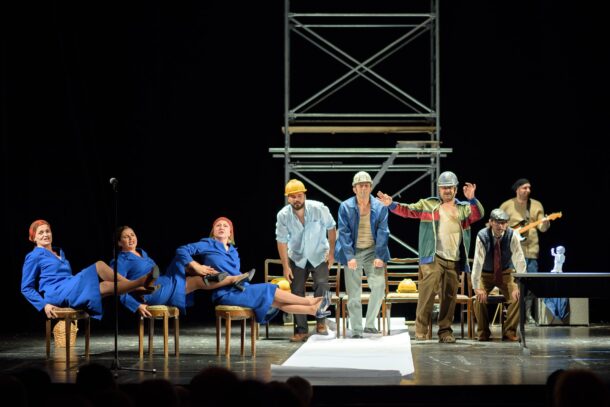
Rebarbor, produced by Odeon Theatre in Bucharest. Photo: Marius Simlea.
Other local productions presented at the festival addressed various aspects of contemporary and historical realities, broadening the context so that we better understand where we stand today. Rebarbor, produced by Odeon Theatre in Bucharest focused on the effects of propaganda on simple people using in a comic approach different texts from the books of an obscure writer of communist times, Alexandru Monciu-Sudinski, while another production of this theatre, Julieta without Romeo was a feminist reinterpretation of classical characters for three actresses. More connected to the war was Exodus, a living – statues performance created by Masca, the only theatre in Romania specializing in street theatre. Based on a concept by director Anca Florea, Exodus uses no words but only gestures to tell stories of refugee people who are first and foremost human beings, a “detail” official statistics and media reports about the war in Ukraine tend to forget.
The independent theatre Apollo 111 from Bucharest was invited with a new production written and created by Catinca Drăgănescu and focusing on a local musical diva, Mihaela Runceanu, whose sudden and still mysterious death in 1989 may have had political motivations, as she was apparently watched by the secret police. Placed on the thin line between reality and fiction, the production titled Disco 89. The 7 deaths of Mihaela Runceanu strongly benefits from the presence of actress Oana Pușcatu, who sings live from her heart, really channelling Runceanu.
From another Romanian independent theatre, Reactor for creation and experiment in Cluj-Napoca, came three productions authored by women directors, one of them A Helping Claw, dedicated to young audiences, the other two rather focused on deep changes of the theatre tendencies in Romania – Get out of the sun!, written by Alexa Băcanu with contributions from the actors and directed by Leta Popescu – or, more broadly, to an analysis of the concept of Love, seen in its various aspects, as theorized by Lee Brook in her now classic 2018 book All about Love. The author of the performance First Part. Love, Petro Ionescu, interestingly intends to create a trilogy completed with a performative analysis of the concepts of Power and Solidarity, as seen in the contemporary world, starting with Romanian society.
It is no accident that so many productions included in the festival selection this year were authored by women, it is rather a statement of Gianina Cărbunariu and her curatorial team, who created last year an award in the name of the most famous and one of the few Romanian women theatre directors, Cătălina Buzoianu, who died in 2019 within one year after another famous Romanian theatre and film director, Lucian Pintilien. An award was created by UNITER, the Romanian theatre guild, in his name, while her memory was not given the same kind of attention. This is just another effect of a historical disparity, as the number of productions created by men in Romanian public theatres has always been and still is today considerably higher than the number of productions created by women, while women are thriving more in independent theatres (which have only flourished after 2010). This is a situation that Gianina Cărbunariu, who has been active for more than a decade on the independent stage before becoming the manager of this public institution in 2017, wanted to bring to attention. The “Cătălina Buzoianu Award” was handed this year to Reactor for creation and experiment for their three productions created by women directors and writers successfully presented in the frame of the festival.
While writing these lines I kept thinking about a production written and directed by Gianina Cărbunariu herself which framed last year’s festival (see European Stages, vol. 16) and was in many ways the beating heart of the festival this year again, as it was initially conceived to be a beating heart for the city.
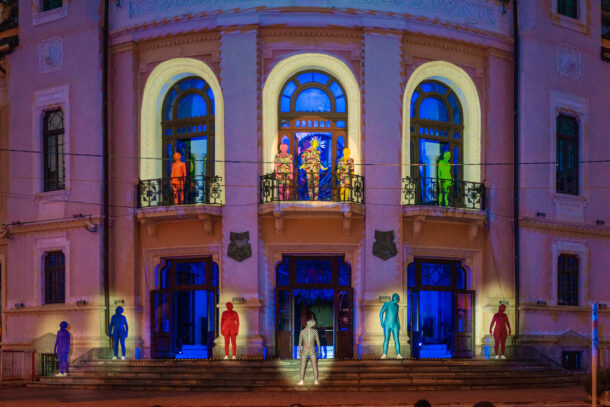
To be continued. On the planet mirror, by Gianina Cărbunariu. Photo: Youth Theater, Piatra Neamt.
To be continued. On the planet mirror imagines a future where the Earth is almost destroyed and aliens from another planet come on a rescue mission trying to collect samples and preserve what matters most for the people on Earth. Besides rare species of animals they want to save and bad habits they want to discard, so they don’t become like those who have torn down their own planet, the aliens are faced with a conundrum, as they landed their ship in a theatre building in the middle of a performance of Chekhov’s The Seagull: should they save theatre, is this art really essential for humankind or should they let it die?
This is a rhetorical question which sounded painfully relevant in 2021 when this production was created and still produces echoes as time passes, To be continued is a real gem in terms of how it uses the theatre building and transforms it into a stage. The spectators are placed on chairs facing the building and they use headphones to hear the texts actors are saying, while the original soundtrack mixed by Alex Halka can be heard out loud. Passers-by are tempted to stop and forget where they were going as the building is animated by lights and actors appear on balconies, at windows, on the staircases, at some points advancing into the space reserved for spectators and dancing between their chairs. The eerie effect of meeting another species is enhanced by the costumes imagined by Dorothee Curio, their bright, fluorescent colours piercing the night alongside the dancing beat of the soundtrack. Using the musical form, the actors as aliens, all joyful and colourful, are in fact telling a very sad story, a story about a dying planet – the Earth – and its indifferent people.
If theatre has the power to awaken its spectators and make at least some of them act differently then maybe it deserves to be saved.
1 Cristina Modreanu – Theatre as Resistance. Artists as seen in the Securitate’s archives, ed. Polirom, Bucharest, 2022
Cristina Modreanu is a curator, theatre critic and expert in performing arts based in Bucharest, Romania. She is the author of six books and many articles on Romanian Theatre. She wrote “A History of Romanian Theatre from Communism to Capitalism. Children of a Restless Time,” published by Routledge in 2020. She is a Fulbright Alumna and she was a Visiting Scholar at NYU Tisch School of the Arts, Performance Studies Department, New York 2011-2012. Modreanu is currently the editor of the Performing Arts Magazine Scena.ro which she co-founded in 2008 and a theatre researcher at Babeș-Bolyai University.

European Stages, vol. 17, no. 1 (Fall 2022)
Editorial Board:
Marvin Carlson, Senior Editor, Founder
Krystyna Illakowicz, Co-Editor
Dominika Laster, Co-Editor
Kalina Stefanova, Co-Editor
Editorial Staff:
Asya Gorovits, Assistant Managing Editor
Zhixuan Zhu, Assistant Managing Editor
Advisory Board:
Joshua Abrams
Christopher Balme
Maria Delgado
Allen Kuharsky
Bryce Lease
Jennifer Parker-Starbuck
Magda Romańska
Laurence Senelick
Daniele Vianello
Phyllis Zatlin
Table of Contents:
- AVIGNON 76. A Festival of New Works by Philippa Wehle
- Almodóvar’s Women on the Verge in Portugal by Duncan Wheeler
- BRACK IMPERie. About “Hedda Gabler” by Vinge/Müller at Norske Teatret Oslo by Thomas Oberender
- Embodied Intimacy: The Immersive Performance of The Smile Off Your Face at Edinburgh by Julia Storch
- Fear, Love, and Despair – Radu Afrim: Director of Core Feelings by Alina Epîngeac
- Grec Festival de Barcelona, July 22 by Anton Pujol
- I Think of Curatorial Work in Scholarly Terms: An Interview with Ivan Medenica by Ognjen Obradović
- New Worlds Revealed in an Immigrant Journey, and an Unexpectedly Meaningful Universe Discovered and Destroyed Inside Styrofoam, at the Edinburgh Festival by Mark Dean
- Participation, Documentary and Adaptation: Barcelona Theatre May 2022 by Maria Delgado
- Report from Berlin, April 2022 by Marvin Carlson
- Report from Berlin (and Hamburg….) 5/2022 by Philip Wiles
- The Sibiu International Theatre Festival Transforms Dreams into Reality (The Magic of 2022 FITS in Short Superlative) by Ionica Pascanu
- Theatre in Denmark and The Faroe Islands – Spring 2022 by Steve Earnest
- The Polish Nation in a Never-Landing Aircraft by Katarzyna Biela
- The Piatra-Neamt Theatre Festival in Romania: 146 Kilometers from Heart to Heart by Cristina Modreanu
- Will’s Way at the Shakespeare International Festival Craiova 2022 by Alina Epîngeac
- Interview with the Turkish theatre critic Handan Salta on TheatreIST by Verity Healey
Martin E. Segal Theatre Center:
Frank Hentschker, Executive Director
Marvin Carlson, Director of Publications
©2022 by Martin E. Segal Theatre Center
The Graduate Center CUNY Graduate Center
365 Fifth Avenue
New York NY 10016
European Stages is a publication of the Martin E. Segal Theatre Center ©2022


